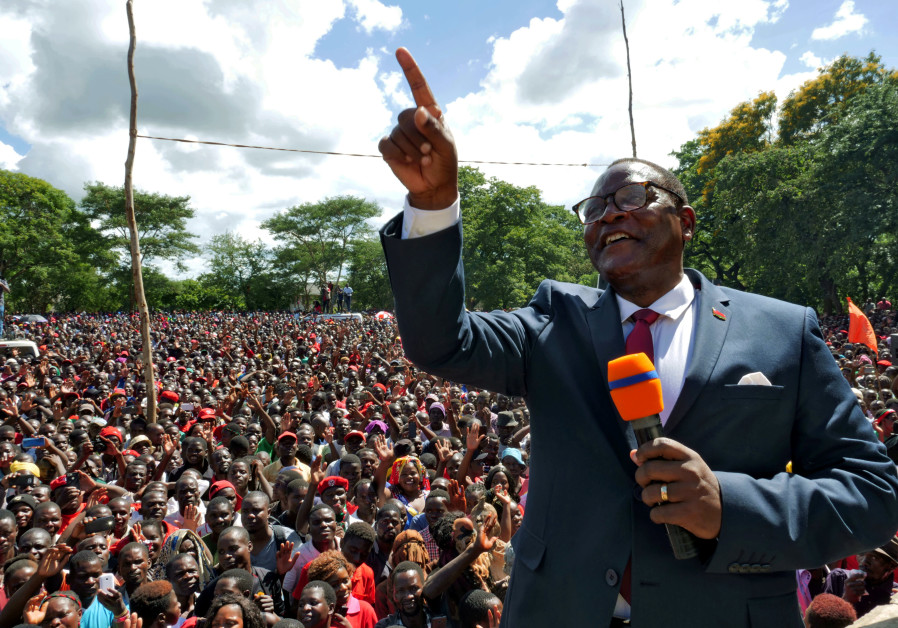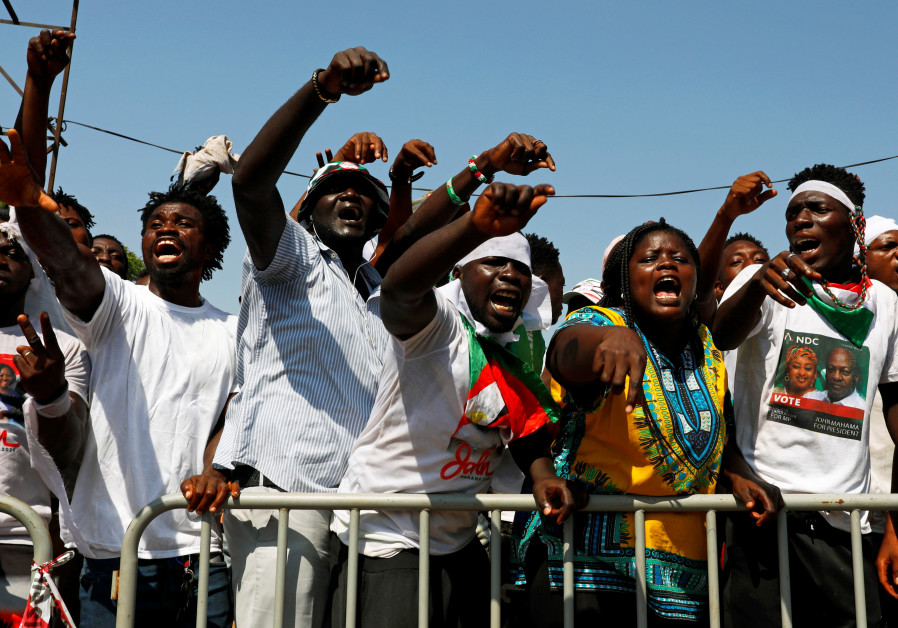Last August, in the middle of the night, 14 Israelis quietly landed in Ghana.
The group arrived at Kotoka International Airport on a private plane and immediately went to the Oak Plaza Hotel along Spintext Road in the capital city of Accra, not far from the shores of the Gulf of Guinea.
A room in the relatively new Oak Plaza, which describes itself as “secluded,” goes for about $100 a night. Not outrageous but pricey for a country like Ghana.
When asked, members of the group said they were “information technology experts,” tech workers who had come to assist local industry.
But according to reports that later came out in the local Ghana media, the group was not there for ordinary business meetings. They had come with an agenda to influence Ghana’s national election in December.
From 2010 to 2016, Waisal’s LinkedIn page says, he worked for the “government of Israel,” a frequently used cover for the Mossad. The Magazine has learned that since 2016 Waisal has worked in private-sector firms with strong connections to ex-Israeli intelligence officials, though at the time he allegedly traveled to Ghana he was not a full-time staff member.
Waisal denied traveling to Ghana, claiming he had not left Israel since the coronavirus broke out in the country last March. In talks with the Magazine, he could not explain how his name and photo, confirmed as authentic, appeared in local Ghana reports. A source did indicate that Waisal had once applied for a visa there, but that he had never used it or ended up making the trip. Pressed about Waisal’s denial, The Herald refused to reply.
Danino had worked at Verint Intelligence since 2016 until at least 2019. From 2011 to 2016, he worked for the IDF’s Information Security Department. Incidentally, Verint Intelligence’s director of operations also was a former IDF Information Security official and a number of other Verint staff have similar backgrounds.
The article did not specify how or what the group of Israelis undertook, but described similar incidents of foreign mercenaries being brought in to influence prior elections.

On March 4, the Supreme Court unanimously dismissed Mahama’s election challenges, though it did insist on the Electoral Commission of Ghana correcting certain errors that the commission acknowledged.
The Herald alleged a range of covert actions by Akufo-Addo back in 2016, when he allegedly – with South Africans and Serbians – took various questionable steps surrounding the election.
“The Israelis, our intel revealed, have been brought and tasked to undertake activities with their skill, expertise and experience that will lead to President Akufo-Addo being declared winner of the December 7, 2020, election,” said The Herald’s report.
Did the Israelis help Akufo-Addo sway the election? That remains a mystery. What is clear, though, is that ex-Israeli intelligence officials are increasingly and quietly involved today in elections and government activities throughout Africa.
ON THE one hand, having political strategists from the West or Israel working in developing countries can be politically and economically profitable. There is also nothing illegal about that.
In recent years there have been an increasing number of reports alleging such activities by Israeli companies made up of former intelligence officials.
Even if not illegal, such campaigns – if involving disinformation or tactics designed to provoke or destabilize the country – could be viewed as problematic back in Jerusalem.
According to the report, the future of the project could be impacted by Ghana’s complex politics and the outcome of the December election. This means that the Israeli government itself might have had an interest in the race.
Some sources also speculated that the chances these Israelis were involved in illegal or problematic election activities is higher because they arrived at a high-stakes point, late in the election cycle, when Akufo-Addo allegedly needed a “game changer” to win, in the middle of a corona wave and under secretive conditions.
Furthermore, sources have said that the incumbent president, like many in Africa, engaged former European intelligence officials to act aggressively on his behalf in relation to the election.
On top of that, some sources expressed skepticism that Ghana’s Election Commission or Supreme Court would overturn an election win of an incumbent president, regardless of evidence of irregularities.
Without specific evidence, they cited trends in Africa of election officials and courts being overwhelmingly unwilling to stare down a country’s ruler.

TO BETTER understand what might have happened in Ghana, it is helpful to delve into the bigger picture of Israeli involvement in elections in Africa.
Sources have told the Magazine that there are Israelis involved in election campaigns in almost every one of Africa’s more than 50 countries.
In addition, almost all major Israeli political advisers and strategists have some activities there. Some are Mossad agents who were formerly stationed there and stayed, and others are Israelis brought in through the extended family of consultants.
Making clear that he had no connections to Ghana, Ari Harow – a former chief of staff to Prime Minister Benjamin Netanyahu and campaign strategist – said that while politics are definitely local, Israelis have an edge in their digital expertise.
“Tip O’Neil famously said ‘All politics is local,’” Harow said. “In the age of globalization, I argue that all politics is global.
“Today, campaigns in places like Africa or South America are very similar to the United States or Israel. While there are cultural differences wherever you go, the similarities in research, messaging, digital campaigning are much greater.”
In some cases in Africa, this could mean a hybrid campaign where 80%-90% of the issues are handled using advanced digital media and polling methods, and the rest are still handled by local operators with face-to-face meetings.
Adi Timor, a political adviser with more than 10 years of experience in Africa, said that the spread of high-speed Internet changed the continent.
Between 2012 and 2017, she explained, people who received news using an Internet connection went from under 10% to around 90% in Sierra Leone.
“Now everyone has a smartphone. There is lots of available Wi-Fi. The world is open before you,” she affirmed.
In Malawi, Timor worked as a political adviser to President Lazarus Chakwera, who was elected in June 2020. What Timor found most significant was that Chakwera was elected in a redo-election after Malawi’s constitutional court annulled the first one in May 2019 due to vote tampering.
She said the fact that an African country could cancel an election win for an incumbent president, allowing a challenger like Chakwera a fair chance to win the rerun race, shows how far the continent has come.
Timor said that she is more accepted as a female political adviser in Africa than she would be in Israel.
She listed off Liberia, Ghana, Kenya, Malawi and Mozambique as countries with increasing levels of female participation in government.
But not all Israelis in Africa are like Harow or Timor. Many are former intelligence personnel who joined the private sector after their government jobs and now work as campaign advisers or consultants across the continent.
Sources explained that sophisticated technology is now available almost everywhere for social media information or disinformation campaigns which aim to manipulate public opinion and election outcomes.
In Western democracies, these kinds of methods are more likely to be caught than in Africa, where oversight is weaker.
Regarding the mysterious Israeli trip in Ghana, some sources said it could just be Israelis using fancy data-mining technologies to gather opposition research – a standard part of any modern campaign.
Part of the problem is that some Israeli companies have been caught allegedly involved in illegal or shadowy operations in Africa, sometimes relating to elections and sometimes with local officials. There have even been court cases against Israeli companies, including a 2016 conviction of Israeli company NIP Global by an Israeli court for bribery of an official in Lesotho.
WHILE INTERFERENCE in other countries’ politics has become a worldwide phenomenon impacting even Western democracies, sources claimed there might be an even greater danger of disinformation in Africa leading to actual widespread violence.
Which is why in regard to the Ghana story – without clear evidence of what the 14 Israelis were doing there – there is reason to worry. In the 2019 Transparency International Corruption Perception index, for example, Ghana ranked 41 out of 100, with 100 being the cleanest.
The December 7 election was the third in Ghana between Akufo-Addo and Mahama.
Mahama won and served as president from 2012 to 2016; Akufo-Addo won and served from 2016 onward; and 2020 was the year they once again ran against each other.
And while Ghana is a democracy, it has a history of serious accusations of corruption, both in regular times and as part of elections.
Reuters has reported that Akufo-Addo won in 2016 by capitalizing on attacks on Mahama regarding an economic downturn due to falling prices for gold, oil and cocoa exports, and vowing to cut a $1.6 billion budget deficit. The report also accused Mahama of corruption.
The other, more conspiratorial narrative would be what has been promoted by The Herald about former Israeli intelligence agents being smuggled into the country to flip the election.
However, aspects of The Herald’s account of election tampering by Akufo-Addo (in order to help prove he again tampered with elections in December) might not make logical sense, because in 2016 he was in the opposition.
He did not have his hand on any of the levers of state power which would have helped him tamper with the election, and then-president (now opposition leader) Mahama did not demand an investigation.
Pressed to explain this potential hole in the argument that Akufo-Addo is a person who chronically tampers with elections, The Herald responded to the Magazine, “Very legitimate questions by you. But my simple answer is that Ghana is a divided country. If then-president Mahama had insisted on investigating the hacking, many would have said it was a decoy to hang on [to] power.
“If the electoral commissioner had tried investigating or indeed investigated it, she would have been accused of using inferior tactics to rig the election for Mahama because she [was] appointed when the position became vacant,” said the statement.
A lot about the story, though, remains unclear. Some of the blanks can be filled in by other recent Western media and Ghana media reports.
On November 17, BBC, Voice of America and others reported that Ghana’s anti-corruption “czar” quit in protest of Akufo-Addo’s alleged interference in a report the czar was writing on corruption.
On November 22, local Ghana media reported that Electoral Commission officials found some ballot papers with duplicate serial numbers.
On November 23, Mahama accused Akufo-Addo of covering up the corruption of some of his close associates and of a plan to shut down the Internet around election day to try to control information.
Also on November 23, the Electoral Commission announced that polling stations would be manned by verification officers who would use biometric devices to verify all voters’ identification before allowing them to vote.
That was just before December 7.
Since December 7, Mahama has received support from multiple representatives who were present at Electoral Commission headquarters claiming irregularities.
On the flip side, the leaders of the commission say the election was free and fair, supported by the Supreme Court ruling of March 4.
We may never fully know what those 14 Israelis were up to in Ghana. In the broader story, Israelis’ election consulting activities in Africa are likely a huge mix of both standard and aboveboard as well as more questionable activities.
But the story also is not over. The opposition loyal to Mahama in Ghana’s legislature still wields sufficient election challenges so that they may take control.
Only two months after the storming of the Capitol Building in Washington, DC, the beacon of democracy, how strong can Ghana’s or any other African democracy remain when sophisticated former Israeli intelligence officials may be bearing down on them at any moment?
